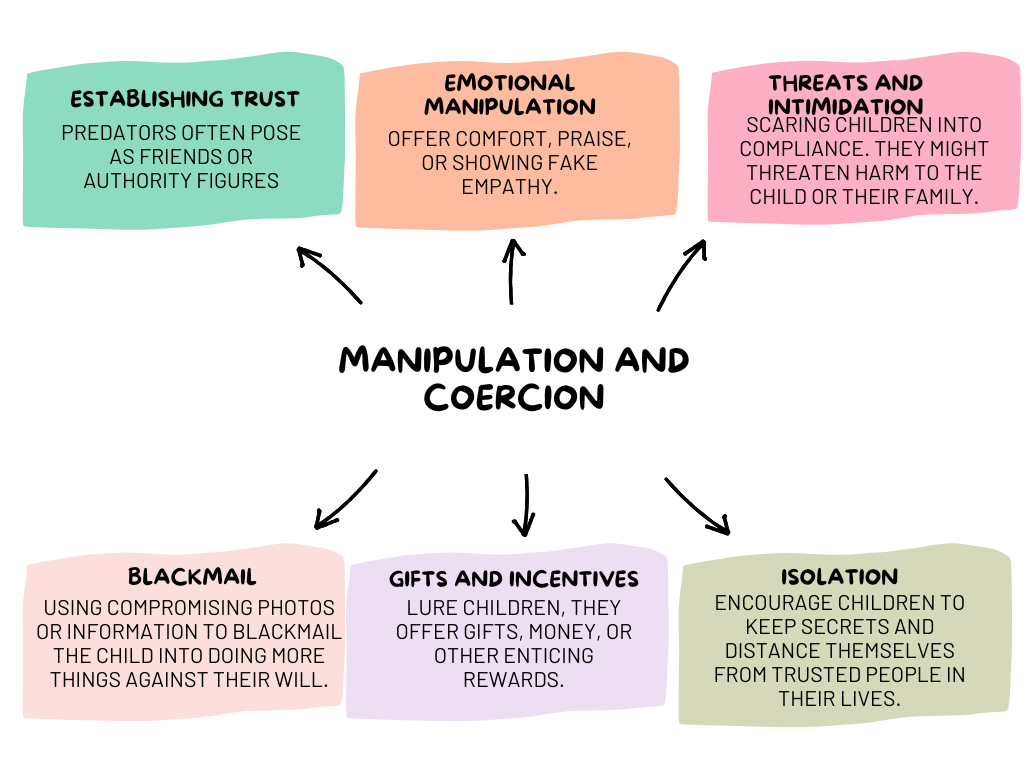Why Are Children So Vulnerable To Online Exploitation?🦋
Exploitation of children online is a growing concern.
Exploitation means treating someone unfairly for personal gain. Many forms exist, like abuse and manipulation.
Children are more vulnerable due to their developmental stages.
Online predators easily prey on kids because the internet allows anonymity and easy access. Adverse Childhood Experiences also increase these risks, costing society greatly.
Understanding these issues helps protect children from harm. This article explains why children are so vulnerable to online exploitation and how we can prevent it.
Key Takeaways
- Children are easy targets due to their developing brains and past traumatic experiences. Predators exploit their innocence and trust.
- Online predators use anonymity, making it difficult to identify them. They gain children's trust by pretending to be friends or peers.
- Exploitation can lead to severe mental health issues like anxiety, depression, and PTSD in children.
- Education programs help kids recognize online dangers. Early intervention empowers children to have safe internet habits and helps prevent exploitation.
- Adults must learn the signs of exploitation. Monitoring kids' online activities and setting parental controls reduce risks
Understanding Online Exploitation
Online exploitation harms children through various deceptive practices. It involves manipulative tactics that can result in emotional and physical trauma.
Definition and Key Concepts
Exploitation: Exploitation can be defined as the act of involving a child for economic or other reasons in criminal activities. Exploitation may take place at the hands of parents, neighbors, schoolmates, cults, employers, etc. (U.S. Department of State).
Child Sexual Exploitation: This is generally defined as involving a child in a sexual act for commercial gain. Examples include child pornography, child sex trafficking, sextortion, the live streaming of child sexual abuse, and child sex tourism (U.S. Department of State).
Children face different types of exploitation online. Predators might groom them by pretending to be friends. They can also exploit children through cyberbullying and human trafficking.
The internet makes it easy for these predators to hide their true identities and access vulnerable kids.
“Exploitation is not just about profit; it's about stealing someone's dignity.”
Common Forms of Online Exploitation
Online exploitation takes many forms. Predators may use grooming tactics to build trust with children, often pretending to be someone else. They can manipulate kids into sharing personal information or photos.
These predators might also force children into performing explicit acts on camera.
Another form of exploitation is economic gain. Exploiters may trick kids into providing financial details or make them participate in schemes that benefit the predator financially.
Children who have faced Adverse Childhood Experiences are especially vulnerable to such manipulation and abuse.
Children's developmental aspects play a huge role in their vulnerability to online exploitation...
Factors Contributing to the Vulnerability of Children
Children's developing brains make them easy targets online. Past traumatic experiences can increase their vulnerability to exploitation.
Developmental Aspects
Children's brains are still developing, which makes them more vulnerable to online exploitation. Young children often struggle with impulse control and judgment. This makes it easier for predators to manipulate them.
Fairtrade measures can help mitigate these risks. Teaching kids about safe internet practices at a young age is essential. Early child safety prevention education can prevent many forms of psychological manipulation common in developmental stages.
"Child Safety Prevention education is a great tool to help protect our children online."
Adverse Childhood Experiences
Adverse childhood experiences (ACEs) increase a child's vulnerability to online exploitation. Trauma like abuse, neglect, or household dysfunction can lead to low self-esteem and trust issues.
These children might seek validation and connection online, making them easy prey for predators.
ACEs disrupt development and decision-making skills. Children who face early trauma may struggle to recognize dangerous situations or people. Helping these kids requires understanding their past and providing support systems both offline and online.
The Michigan ACE Initiative has resources to help families learn more about adverse childhood experiences and how to prevent them. Children deserve to grow up healthy and safe.
The Role of Anonymity and Accessibility
The internet allows anyone to be anonymous, making it hard to identify predators. Children can easily access online platforms without realizing the risks involved.
Ease of Access to the Internet
Children today find it easy to access the internet from multiple devices.
Smartphones, tablets, and laptops are common in many homes. This accessibility means they can go online without much parental oversight.
This ease of access exposes them to risks. Predators use anonymity to exploit children. As a result, children become vulnerable targets for exploitation online. You should be aware that this is a growing concern highlighted by major media outlets.
Predator Impersonation Online
Predators often impersonate peers, teachers, or even parents online. They use fake profiles to gain children's trust. CBS News reports on predators posed as teenagers on social media platforms.
By pretending to be someone familiar, these criminals can manipulate children more easily. The anonymity of the internet helps them blend in and makes it hard for authorities to trace their activities.
Understanding these tricks is crucial for protecting kids from exploitation.
Psychological Impact on Children
Online exploitation severely affects children's mental health. They often experience anxiety, depression, and other emotional issues.
Immediate and Long-Term Effects
Children can suffer both immediate and long-term emotional harm from online exploitation. They may feel confused, scared, or ashamed right after the abuse. These feelings often lead to anxiety or depression as they grow older.
Many victims also struggle with trust issues, making it hard for them to form healthy relationships.
The mental scars don't fade easily. Some kids develop Post-Traumatic Stress Disorder (PTSD) due to their traumatic experiences. Others might have trouble in school or display aggressive behavior.
Understanding these effects is key to providing proper support.
Emotional and Behavioral Consequences
Online exploitation severely impacts kids' emotions and behaviors. They may feel fear, shame, and confusion immediately after such incidents. Long-term effects can include anxiety, depression, trust issues, and even post-traumatic stress disorder (PTSD).
Victims often struggle with self-esteem and might withdraw from social activities. These changes can affect their school performance and relationships with family and friends.
These children can also be led down a path of being trafficked and exploited.
More than 70% of sex trafficked victims are sexually abused as a child first.
There are direct links to trauma
continuing as a child becomes an adult, and that trauma can be devastating.
Predatory Practices and Techniques
Predators use various strategies to gain children's trust online. They often manipulate young minds through flattery, gifts, or pretending to be someone else.
Grooming Tactics Used by Predators
Predators use several tactics to groom children online. Understanding these methods can help protect the vulnerable.
- Building Trust: Predators often start by creating a bond with the child. They pose as friends or peers to earn trust.
- Flattery and Gifts: To gain favor, predators give compliments, virtual gifts, or even money.
- Isolating the Child: They manipulate the child to keep secrets from family and friends.
- Sexualizing Conversations: Over time, they shift discussions to sexual topics, making inappropriate requests seem normal.
- Exploiting Emotion: Predators exploit a child's emotions, such as loneliness or seeking validation.
- Impersonation: Some pretend to be someone else entirely—another child or a teenager—to connect more easily.
- Threats and Blackmail: Aggressors may resort to threats if the child resists, using information gained during grooming against them.
Understanding these tactics can empower you to take action and support victims of exploitation effectively.
Methods of Manipulation and Coercion
After learning about grooming tactics, it is crucial to understand the different methods of manipulation and coercion. Online predators use these techniques to exploit children efficiently.
Understanding these tactics can help safeguard vulnerable children from online exploitation. Stay informed and proactive in protecting them.
Exploitation and Human Trafficking
Predators often use the internet to recruit children for human trafficking. They exploit children's naivety and trust, manipulating them into dangerous situations.
Online human trafficking
Online human trafficking often involves luring children into unsafe situations through the internet. Predators use social media, chat rooms, and online games to find vulnerable kids.
They manipulate kids by pretending to be friends or offering gifts.
You can help fight this problem by donating to Hope Against Trafficking in Michigan which works on preventing child exploitation and trafficking. Your support helps us educate children about online dangers and fund rescue operations for victims.
Prevention Education Solutions
Equip children with the knowledge to identify and avoid online threats and have the courage to speak up and tell their safe adults when they spot the red flags or are uncomfortable.
Age-appropriate educational Programs for Children
Age-appropriate educational programs from Hope Against Trafficking are vital for keeping children safe online. These programs teach them about online safety and exploitation.
- Programs like this teach children about staying safe online. The evidence-based, age-appropriate, and comprehensive curriculum explains the risks of sharing personal information.
- Kids learn how to use privacy settings.
- Children become empowered to act when they see suspicious behavior. Our program teaches youth K-12 the signs of grooming and manipulation.
- They know how to report predators.
- Our lessons highlight the dangers of talking to strangers online.
- Interactive activities help children understand digital risks better. Role-playing exercises simulate real-life scenarios.
- Repetition improves learning retention.
- Collaboration with educators and parents makes efforts more effective.
- Awareness helps them avoid risky situations from the start.
This program is essential in protecting our children from online threats.
Educating Adults
Adults play a crucial role in protecting children from online exploitation. Educating them can make a significant difference.
- Recognize the Signs: Learn about changes in children's behavior.
Understand indicators like secrecy, mood swings, and new devices.
- Understand Key Concepts: Familiarize yourself with terms like \"exploit\" and \"exploitative.\"
Know the common forms of online exploitation.
- Use Trusted Sources: Refer to reliable media for updates.
Stay informed on new threats.
- Get Involved in Community Programs: Participate in local workshops and seminars.
Engage with groups focused on child safety online.
- Implement Online Safety at Home: Set up parental controls on all devices.
Educate children about not sharing personal information.
- Actively Monitor Online Activity: Regularly check the child’s internet usage.
Discuss their online interactions openly.
- Advocate for Safe Internet Practices: Promote safe browsing habits.
Encourage reporting any suspicious activity.
- Teach Critical Thinking Skills: Help children question information online
Discourage them from trusting strangers easily.
- Stay Updated on Technology Trends: Keep abreast of new apps and social media platforms.
Understand how these can be misused by predators.
- Encourage Open Communication: Create an environment where children feel safe to talk.
Reassure them that they will not get into trouble for seeking help.
Educating adults is vital for maintaining children's safety online. Knowledge empowers you to better protect your loved ones from threats lurking on the internet.
Conclusion
Children are easy targets for online exploitation and human trafficking. Their innocence and trust make them especially vulnerable. Predators use anonymity to deceive and manipulate children. Awareness is key in protecting them from harm.
Educate both kids and adults on safety measures to reduce risks.
Recover. Rebuild. Restore
We Believe Love Transforms
FAQs
1. What makes children vulnerable to online exploitation?
Children are often naive and trusting, making them easy targets for predators. Their lack of experience with online dangers also contributes to their vulnerability.
2. How do predators exploit children online?
Predators use tactics like grooming, where they build trust over time to manipulate children into harmful situations. They may also pose as peers or use fake identities.
3. Can parents help protect their kids from online exploitation?
Yes, parents can educate their kids about the risks of sharing personal information and monitor their internet usage closely. Open communication is key to keeping children safe.
4. Are there tools available to prevent online exploitation of children?
Various software programs can filter content and track activity on children's devices. These tools can alert parents to potential threats and ensure safer internet experiences for kids.









